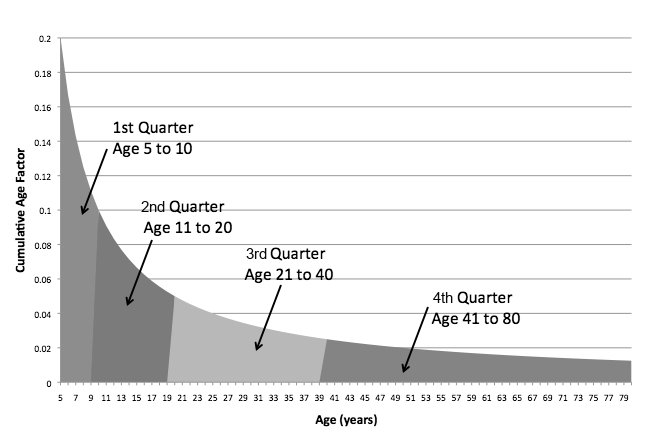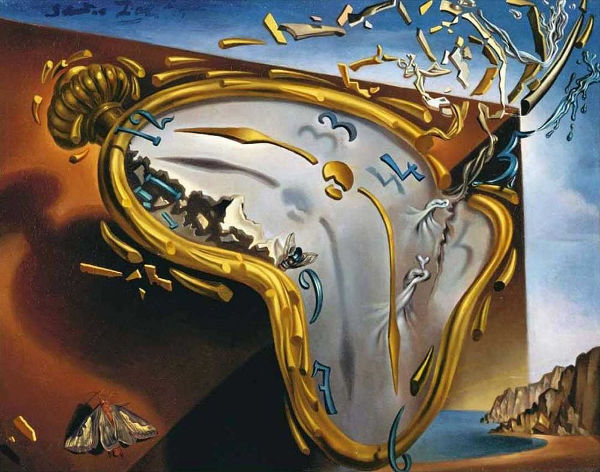I was once took part in a class where the instructor performed an interesting experiment. He asked us all to close our eyes, and then raise our hands and open our eyes when each of us thought a minute of time had passed. After that he would tell us how far we were off. To my amazement there was quite some difference, with some people raising their hands quite early, some quite late, and some nearly spot on. Now, this was not a test of aptitude at timing, it was a test of a specific type of perception: chronoception.
I remember being quite bored at times as a child. Many mundane things seemed to take very long. Yet, the older I have become, the faster time seems to pass. Asking around, I found out that I am not the only one with that experience. During that class I raised my hand slightly later than the one minute marker. However, now, many years later, I am convinced that if I’d take it again, I’d raise my hand quite a bit later than the minute mark.
Time of course passes at a steady rate for everyone, that is: time in the physical world. However, that is not the same rate at which time appears to pass: our chronoception. How do physical and perceived time relate? Let’s dive deeper.
Fraction of Life Argument
When you were one, that one year represented one hundred percent of your life. Conversely when you turned two, the first year constituted half of year life and the second year as well. Following this logic, by the time you turn eighteen that eighteenth year adds only about five and a half percent to your life up to that point.
Going ahead in time, the hundredth year of your life would add only one percent. The basic idea of this fractional argument is that each additional year you live is a smaller part of your life. If we discount things that happen before age five, as most people have little recollection of this, and look at this strictly numerically, we get the graph shown below.

Let’s interpret: roughly your teenage years are about as long as your twenties and thirties combined according to this graph. Although mathematically attractive, there are some problems with this perspective.
Consider that this theory implies that time at age ten seems to go five times more slowly than time at age fifty, and that is not quite what really seems to happen. A ten year old does not see his fifty year old uncle respond in slow motion, and juxtaposed: the fifty year old uncle does not see his ten year old niece dart around five times more quickly. Of course there are differences in time perception, but a five fold difference seems like an unlikely stretch.
In addition to this, there is one other major problem with this fractional argument: it does not accurately represent perceived time, as that does not pass at a constant rate, our chronoception is variable as we’ll see next.
Flow Control
Waiting in a line in the supermarket, particularly when you are in a hurry, seemingly takes forever. You notice the old lady fidgeting with her hands to get the cash money out of her wallet. Then a kid that just can not seem to stop screaming. Followed by someone who nervously taps his foot standing next to you. However, when you finally exit the supermarket and drive home, taking that more quiet route that you know all to well, time passes by very quickly.

This example already shows that perception of time is relative to what occurs around us. When we are bored or blocked, time seems to slow down. Contrast this with when we are performing either routine tasks or are deeply engaged in something: time seems to literally fly by. So, it is easy to disprove the fractional argument on a moment-to-moment basis, but in fact: this holds even for longer spans of time.
Novelty
There is a difference between how we experience time in the moment and how we remember it when we look back. Waiting in line seemingly takes forever in the moment, but after a day or two, in hindsight, it was really just a very small part of that day.
In a similar vein: holidays always seem to go by very quickly. At least: that is what many conclude as soon as theirs are over. However, during your holiday, time actually seems to slow down. There is a good reason for that: new experiences.
In your daily life you see many of the same things every day, you do many of the same routine tasks everyday, and if you enjoy your work you are likely quite engaged in it. In this day-to-day life you have become highly skilled at filtering out distractions. Contrast this with your vacation where you have to do all kinds of non-routine tasks even to get to your destination, and then have complete days to fill in by yourself.
If on those days you do all kinds of activities you do not usually do, that’s all novelty for your brain. These novel things take more mental processing power and occupy more mental space. Your filters don’t work there, and hence everything seems to last longer. This is noticeable in the moment, but also if you start episodically telling others about your novel experiences.
The reverse is also true: if you would not do anything on your holiday, you will experience boredom, which also makes time appear to pass more slowly, at least: in the moment, perhaps not on retelling. Hence, the benefit of holidays for altering your perception of time, whether you do something or just sit there, either way: it helps slow down time perception at least as you experience it in the moment.
Excitement

This same phenomenon of things seeming to take much longer than they actually do also occurs when there is something physically happening that is exciting. People can overestimate the actual time something took by orders of magnitude.
I once had the genius idea to step into a wooden roller coaster, after not having been in one for many years, and not remembering how much I actually disliked such experiences. While the cars were being pulled up, I started remembering that roller coasters were not a pleasant experience, but by then it was too late. As the carts were released at the apex, and my stomach started to turn, I had no other option than to simply endure it. That ride probably took only a minute or two, but really: it seemed way longer than that.
The Brain
As anything in the reality you experience. Time perception too is a construct of your brain. And as your body becomes less agile with age, so does your brain. In fact your brain uses most energy to perceive new things when you are about five, and this tapers off from that point onward.
Consider that as you get older, you have had more opportunity to learn. Hence, the more you learn, the more complex the networks in your brain to represent what you’ve soaked up. Hence the size and complexity of the webs of connected neurons in your brain increases, which leads to longer paths that signals need to traverse.

When these paths themselves start to age, they degrade, giving more resistance to the flow of signals. This causes the rate at which mental images are acquired and processed to decrease as you get older: chronoception changes. Since your brain is perceiving fewer new images in the same amount of time, it seems as though time is passing more quickly. While in fact it is your own brain slowing down. This is an interesting form of perceptual relativity: the world around you is not going faster, you are going slower relative to it.
Your brain also becomes better at filtering out signals irrelevant to whatever you are doing. This is evidenced for example when something small changes in an environment you have been in for a long time. It is very common not to notice that change for a while, since you have tuned out certain details in your environment. The net effect is not only that you see less images, but that you also see less detail in those images. A complete change-up of environment can of course work wonders here.
Conclusion
We know that the older we get, the faster time seem to pass, but the question is: by how much? We know that for people in their early twenties physical time and chronoception are almost equal: they experience time approximately as it passes in physical reality. Seniors, between sixty and eighty, are off with their estimates by approximately twenty to twenty-five percent.
This leads me to conclude that as a rough rule of thumb what on average feels like a week for a twenty year old, feels like about five and half days for a senior. However, that’s an average. This strongly fluctuates based on the moment-to-moment experience.
As anything that you experience, chronoception too is a construct of your brain. It seems that as we get older we literally gradually lose track of time. One of the few ways to mitigate this to some extent is to expose yourself to novelty in any form, in short: go to new places, learn new things and meet new people. But most of all: enjoy your time.
References
- Kingery. K. (2019). It’s Spring Already? Physics Explains Why Time Flies as We Age.
- Muller, D. (2016). Why Life Seems to Speed Up as We Age.
- Livni, E. (2019). Physics explains why time passes faster as you age.
- Haden, J. (2017). Science Says Time Really Does Seem to Fly as We Get Older.
- Bonwit, H. (2012). Time Dilation & Back to the Future.
- Kiener, M. (2015). Why Time Flies.
- Spencer, B. (2017). Time Perception.

